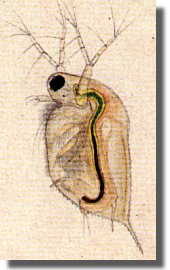|
|
|
Record your answers on a separate sheet of paper, then compare them with the correct answers on the "Quiz Answers" page.
|
|
1. What is the largest Phylum in the Animal Kingdom in terms of population size? a. Arthropoda b. Mollusca c. Insecta d. Vertebrata |
|
2. What class do amphipods belong to? a. Arthropoda b. Mollusca c. Crustacea d. Copepoda |
|
3. What group of Arthropods dicussed in this web site is known/recognized for its extensive fossil record? a. Ostracods b. Copepods c. Amphipods d. Cladocerans |
|
4. What group is also known as the "sand fleas"? a. Ostracods b. Copepods c. Amphipods d. Cladocerans |
|
5. Which group is characterized by a single, centrally located eye? a. Ostracods b. Copepods c. Amphipods d. Cladocerans |
|
6. Which group is the MOST closely related to lobsters (Order Decapoda)? a. Ostracods b. Copepods c. Amphipods d. Cladocerans |
|
7. What group is also known as the "water fleas"? a. Ostracods b. Copepods c. Amphipods d. Cladocerans |
|
8. In this group, the females carry eggs in a marsupium (sac) until they hatch. a. Ostracods b. Copepods c. Amphipods d. Cladocerans |
|
9. These organisms lack gills and appendages on their abdomens. a. Ostracods b. Copepods c. Amphipods d. Cladocerans |
|
10. Which group is unique because the body trunk bears, at most, two pairs of appendages? (HINT: it has a bivalve shell) a. Ostracods b. Copepods c. Amphipods d. Cladocerans |
11-14: Match the picture with it's order or subclass


 a. Amphipoda b. Ostracoda c. Cladocera d. Ostracoda |
|
15. True or False: Amphipods play an important role in ecosystems. a. False: they don't occur in large enough numbers to have significant ecological importance b. False: they're too small c. True: they make up a large part of the organisms known as 'zooplankton' and are the main source of food for many different organisms. d. True: they are toxic and are responsible for the deaths of large numbers of organisms. |
|
16. True or False: It is possible to collect an organism from all four groups in Knox County for your collection. a. False: one or more of the groups only occurs in salt water b. False: one or more of the groups does not occur in North America c. True: it is possible, but copepods are extremely rare and hard to find. d. True: although many of the organisms occur only in salt water, there are freshwater representatives from all four groups and most are quite common in the rivers, streams or lakes. |